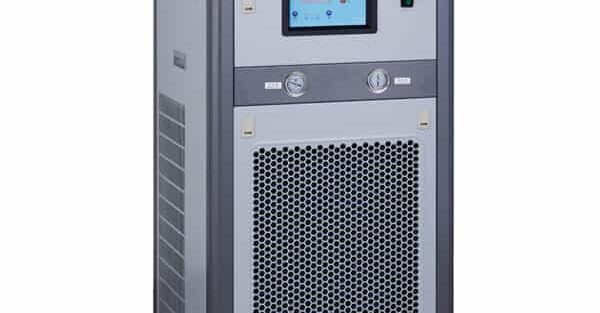Industrial applications require control of ambient temperature, and low-temperature industrial water chillers are necessary to achieve ideal operation. These advanced cooling systems are utilized to realize demanding industry processes with temperatures far lower than those of conventional chilling. For chemical process, food process, pharmacy production, or plastic injection, low-temperature industrial water chiller equipment offers efficiency, product quality, and equipment life.
This complete guide addresses the meaning of industrial low-temperature water chillers, their primary applications, technical specifications, and choosing a reputable low-temperature industrial water chiller supplier. We will also address best practices in maintenance and future development for industrial cooling technology.
Knowledge of Low-Temperature Industrial Water Chillers
Low-temperature industrial water chiller is industrial refrigeration equipment that provides water or process fluid cooling to sub-zero temperatures, usually between -40°C to 5°C (-40°F to 41°F). The difference between a low-temperature industrial chiller and a regular chiller is that it uses a large-capacity heat exchanger, refrigerant, and compressor to provide sub-zero cooling with acceptable efficiency.
Key Components of Low-Temperature Industrial Water Chiller Equipment
- Compressor – Centrifugal, screw, scroll, or central, based on cooling capacity needed.
- Evaporator – Pulls heat from process fluid, typically constructed of corrosion-free materials like stainless steel or titanium.
- Condenser – Passes absorbed heat to air, in air-cooled, water-cooled, or evaporative cool configurations.
- Expansion Valve – Regulates flow of refrigerant precisely to produce stable temperatures.
- Control System – Advanced PLC or microprocessor control for real-time feedback and reprogramming.
- Refrigerant – R404A, R507, and ammonia (NH3) for ultra-low-temperature applications.
Difference Between low-temperature chillers and normal chillers
- Lower Operating Temperature: Down to sub-zero temperature.
- Normal chillers are functioning down to more than 0°C.
- Higher Durability: Made of tough material to face the industrial environment conditions.
- Higher Efficiency: Make use of enhanced heat recovery and compressors as a step towards decreased power usage.
Important Applications of Low-Temperature Industrial Water Chiller
Low-temperature industrial water chiller plant’s wide applicability makes it an absolute requirement in nearly all industries:
1. Pharmaceuticals & Biotechnology
- Vaccines Storage & Production: Offers ultra-low temperatures around the clock for sensitive biological substances.
- Lyophilization (Freeze-Drying): Utilized in the storage of drugs and diagnostic reagents.
2. Food & Beverage Processing
- Ice Cream & Frozen Desserts: Needs a consistent freezing temperature throughout production.
- Meat & Seafood Processing: Inhibits bacterial growth and increases shelf life.
- Be Beverage Cooling: On-the-spot cooling of a liquid to pack or into a container.
3. Chemical & Petrochemical Processes
- Chemical Reaction Cooling: Anticipatory cooling below ambient to prevent runaway reactions.
- Gas Liquefaction: Used in LNG and other cryogenic applications.
4. Plastic & Rubber Processing
- Injection Molding: On-the-spot cooling for quality plastic parts.
- Extrusion Processes: Temperature control for uniform rubber and polymer extrusion.
5. Laser Cutting & Semiconductor Fabrication
- Laser Cooling: Protects against power laser overheat.
- Wafer Fabrication: Regulates accurate temperature within a cleanroom environment.
6. Aerospace & Automotive Testing
- Environmental Simulation: Mimics extreme cold auto part testing.
- Composite Material Hardening: Enables world-class hardening of advanced materials.
Choosing the Appropriate Low-Temperature Industrial Water Chiller Manufacturer
Choose the appropriate low-temperature industrial water chiller manufacturer to have system longevity, stability, and operating performance in the long term. The most important are:
1. Specialized Expertise & Custom Solutions
Choose the manufacturer that can provide custom solutions to a particular cooling operation.
Make sure they can provide alternative refrigerants (e.g., R404A for -40°C or ammonia for industrial at masses).
2. Energy Efficiency & Sustainability
- Variable Speed Compressors: Dynamically adjust cooling capacity based on energy-saving requirements.
- Heat Recovery Systems: Harness waste heat from other processes to maximize overall efficiency.
3. Construction Quality & Life
- Stainless Steel or Titanium Evaporators: Corrosion-proof in aggressive applications.
- Heavy-Duty Condenser Design: Provides heavy-duty heat rejection in high-ambient operating conditions.
4. Industry Approvals & Compliance
- ISO 9001: Provides quality management systems.
- CE & UL Certification: Provides electrical and safety certification.
- ASHRAE & EPA Compliance: Environmentally friendly based on refrigerant regulation.
5. Post-Sales Support & Maintenance Services
- 24/7 Technical Support: Crucial for minimizing downtime in mission-critical operations.
- Preventive Maintenance Programs: Optimize equipment life and peak performance.
Low-Temperature Industrial Water Chiller Optimum Maintenance Practices
For the best low-temperature industrial water chiller equipment performance and life, implement these maintenance practices:
1. Periodic Inspection
- Inspect refrigerant level and expect leakage.
- Inspect electric contacts for corrosion and wear.
2. Cleaning of Condenser & Evaporator Coil
Improves heat transfer efficiency by eliminating clogging.
3. Monitoring of System Performance
Monitor temperature stability and energy consumption trends.
4. Timely Professional Service
Periodic servicing by authorized and certified service technicians ensures optimum performance.
Low-Temperature Industrial Chill Technology Trends of the Future
IoT Smart Chillers
Cloud-based remote monitoring for predictive maintenance.
Natural Refrigerants
Shift to Electrically Conductive Refrigerants
such as R513A.
Hybrid Cooling Systems
Air-water hybrids for highest efficiency.
Energy Recovery Innovations
Waste heat recovery to make useful energy available for secondary applications.
Conclusion
Low-temperature industrial water chiller is an unavoidable expense and has to be balanced by organizations that require accurate and dependable cooling. Utilizing the highest quality equipment of a highly credible low-temperature industrial water chiller supplier, organizations can achieve improved efficiency, lessened operating cost, and more process reliability.
For pharmaceutical use, food processing, chemicals, or manufacturing, a proper chiller system can be a time and quality saver on your product. Understand your cooling requirements, investigate manufacturers, and look for energy efficiency, reliability, and after-sales support in making a well-informed purchasing decision.
Green refrigerants and intelligent technologies will make sure that tomorrow’s industrial chillers become more efficient and environmentally friendly, and upcoming chillers will be high-performance and the latest kind. At the forefront as a leading manufacturer and in the loop regarding the latest trends in industrial cooling technologies.




